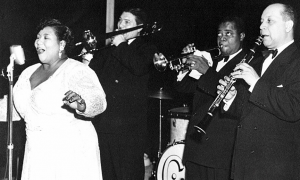Home » Jazz Articles » Highly Opinionated » A Tale of Two Jazz Humbugs
A Tale of Two Jazz Humbugs
The K-12 kind I know from close observation. In the first decade of the twenty-first century I was involved in starting a public charter high school in Roxbury, a neighborhood of Boston that has historically been predominantly African-American. Many inner-city schools have no music department; in the case of a charter school, the founders start from scratch so none do, at least on the day they open.
Walk into a band concert at a typical suburban high school and you will see an array of instruments that—with minor additions—could pass for that of a major metropolitan symphony. It thus occurred to me that one way to build a music program at an urban school that lacked one was to acquire cast-off instruments from suburban schools.
I accordingly approached the music director of one such program and asked him whether he had a trumpet or a saxophone he could spare.
Without missing a beat, he said no.
How about a snare drum?
He took a little longer to reply, but the answer was the same.
With sarcasm that was lost on him, I asked if he had an extra drumstick, or maybe a reed he didn't need?
Again, the answer was no.
Before you jump to the conclusion that the fellow was a hard-hearted conservative, like Mr. Potter in the Frank Capra movie It's a Wonderful Life, in the town where this man lives Democrats outnumber Republicans by 3 to 1. The school makes a big show of Black History Month, with a gospel concert that includes students imported from the inner city to sing "Wade In the Water," "We Shall Overcome," and "Lift Every Voice and Sing," the "Black national anthem" by James Weldon and J. Rosamond Johnson.
But talk is cheap, and drumsticks are expensive, I guess.
The school has two jazz groups but doesn't do much to encourage students to learn its history; the program from a recent concert noted that the music of Stan Kenton and Maynard Ferguson was included, but then listed "Caravan" without mentioning Duke Ellington, and "Blues in Hoss Flat" without crediting Count Basie. Maybe we don't recognize titles of nobility in America, but the latter two are genuine jazz royalty.
The higher educational variety of jazz humbug is easier to spot. He occupies the sort of secure sinecure at a prestigious college that would have provided welcome relief to a road-weary jazzman or woman of the thirties, forties or fifties. He has a record contract, and awards of the type that come not with just a little Grammy statue, but money to live on when jazz leaves him short of cash. Nonetheless, he's angry—perhaps because it's fashionable—although it's not clear about what.
Again, I solicited a donation from one such man for a Boston public high school that hasn't had a music department for thirteen years, and which is in the news from time to time for gang violence. My thought was the same as William Congreve's: Music has charms to soothe a savage breast; if you put a musical instrument in a kid's hands maybe he'll drop the gun or the knife.
As the old country song goes, when the phone don't ring, I'll know it's you—not a word was heard in return. I checked social media; comments are closed on what he posts so you can't reach him, although he keeps up a running diatribe against those who disagree with his musical tastes, calling them racists (he is not himself African-American). As far as I can tell the extent of his commitment to the improvement of the race that is primarily responsible for creating jazz is... a song dedication. Don't get me wrong: Everyone is entitled to do what they want with their time, money, and spare saxophones. But if you're going to talk the talk, you should walk the walk.
The current project that I'm trying to find instruments for is designed to honor the music of Johnny Hodges in Cambridge and Boston, the cities where he was born and grew up respectively, by incorporating his work with Ellington and as a solo artist into a high school curriculum. On a national level, the Save the Music Foundation is engaged in similar work in fifteen other states, including programs in Detroit, Atlanta, Baltimore, and Dallas.
The Save the Music Foundation accepts only monetary contributions, but the notion of growing a jazz ensemble by accretion of instruments isn't a new one. The 19th century Black musicians who transformed the repertoire of community brass bands into jazz did so by acquiring instruments one by one, often buying them in pawn shops where Confederate soldiers had hocked them after the Civil War. If a musician who played a communally purchased instrument left the band, his instrument remained behind with the group.
So next time you get a cold call from someone asking "Brother, can you spare a trumpet"—don't hang up on him.
< Previous
Julian Lage at Ann Arbor's Ark
Next >
Consecutio
Comments
Tags
Highly Opinionated
Con Chapman
Stan Kenton
Maynard Ferguson
duke ellington
Count Basie
Johnny Hodges
For the Love of Jazz
 All About Jazz has been a pillar of jazz since 1995, championing it as an art form and, more importantly, supporting the musicians who create it. Our enduring commitment has made "AAJ" one of the most culturally important websites of its kind, read by hundreds of thousands of fans, musicians and industry figures every month.
All About Jazz has been a pillar of jazz since 1995, championing it as an art form and, more importantly, supporting the musicians who create it. Our enduring commitment has made "AAJ" one of the most culturally important websites of its kind, read by hundreds of thousands of fans, musicians and industry figures every month.






















